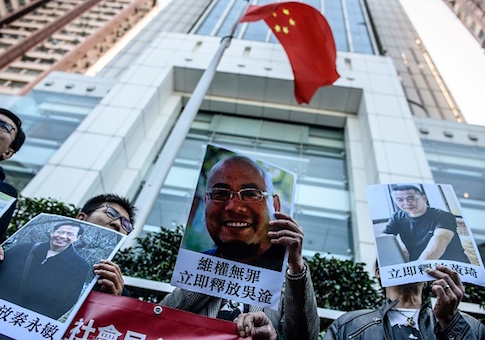BEIJING (Reuters) - The United States and Germany called on China to immediately release a prominent human rights activist who was jailed for eight years on Tuesday for subversion, the harshest sentence passed in a recent crackdown on activism.
Wu Gan, a blogger better known by his online name "Super Vulgar Butcher", regularly championed sensitive cases of government abuses of power, both online and in street protests. He was detained in May 2015 and charged with subversion.
In a separate case, also on Tuesday, rights lawyer Xie Yang avoided criminal punishment despite being found guilty of inciting subversion, because he admitted to his crimes.
"We call on the Chinese authorities to release Wu immediately," the U.S. and Germany embassies in China said in a joint statement.
"As Xie has been exempted from punishment, we urge China to allow Xie to resume his professional activities without preconditions and be free of any restrictions."
China's Foreign Ministry did not immediately respond to a request for comment, but Beijing frequently denounces foreign concern about rights cases as an interference in internal affairs and says China is a country with rule of law.
Wu, in a statement released by his lawyers late on Tuesday, said he considered the sentence an "honor" as it proved that he had not become a "slave" or "accomplice" to the China's "autocracy".
"I got eight years, but I feel no grief or despair. This was my choice, because opposing autocracy means you are already on the road to jail," Wu said in the statement.
"I call on the international community to pay attention to China's deteriorating human rights situation," he added.
Wu's sentence was the most severe in what rights groups have called an unprecedented attack on rights activists and lawyers, known as the 709 crackdown, which began in full force on July 9, 2015.
The hardline approach has shown no sign of softening as President Xi Jinping enters his second five-year term in office, and has drawn widespread concern in Western capitals.
Germany has been particularly outspoken, to China's irritation.
Speaking at a daily news briefing on Wednesday, Foreign Ministry spokeswoman Hua Chunying expressed displeasure at comments last week by the German ambassador on China's failure to set up a previously agreed upon cyber consultation mechanism.
China had, in fact, invited Germany to send representatives to talks, but the Germans kept putting China off, Hua told reporters.
China hoped the ambassador stops saying such "irresponsible remarks", she added.
(Reporting by Ben Blanchard and Christian Shepherd; Editing by Nick Macfie, Robert Birsel)
